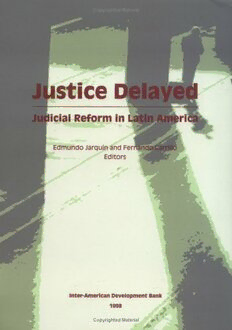
Justice Delayed: Judicial Reform in Latin America PDF
171 Pages·1998·8.555 MB·English
Most books are stored in the elastic cloud where traffic is expensive. For this reason, we have a limit on daily download.
Preview Justice Delayed: Judicial Reform in Latin America
Description:
In many Latin American countries, judicial institutions suffer from long delays, extensive case backlogs, limited access to justice, and lack of transparency and predictability in court decisions. The complex problems facing judicial systems range from inefficient administration to the denial of fundamental human rights. Regarding the latter, a distinguished Peruvian jurist writes that a person in pretrial detention who has no attorney may never even get a verdict. "Someone else has to move the case, for the judge will not."In Justice Delayed, leading authorities on law and economies from Latin America and the United States analyze the problems of the region's judicial sector and propose strategies for solving them. The authors show that, just as Latin America's fledgling market economics must be based on guarantees for property rights, the future of democratic institutions in the region will depend on impartial and reliable systems of justice.Judicial reforms must address many complex issues, including modernization of the law, protection of fundamental rights, the struggle against corruption, and ways of controlling violence. In all countries, broad national consensus and political leadership will be required, as well as the support of civil society organizations and the mass media.
See more
The list of books you might like
Most books are stored in the elastic cloud where traffic is expensive. For this reason, we have a limit on daily download.
